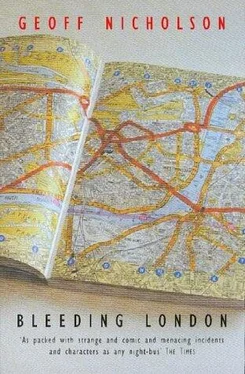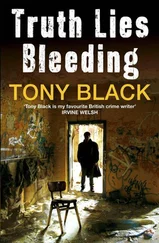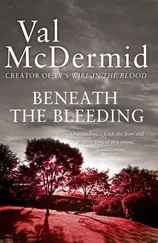He said, “Supposing a man breaks into your house, a man with a gun, a madman. You’re at home, sitting quiedy with your wife and one of your kids. The madman makes you an offer, gives you a choice. He tells you he’s going to kill someone, either your wife or your kid. But he’s not sure which, it’s all the same to him. And so he wants you to decide for him.”
“Is this a joke?” I asked.
“No,” said the driver. “It’s a moral conundrum. You have the choice of losing a spouse or a child: which do you go for?”
“What if I don’t make a choice?”
“Then he’ll kill both of them.”
“What if I don’t have any children?”
“Then you have to imagine.”
I imagined, and said, “I’d let him kill me.”
“No, no, no.” The driver was getting quite irritated. “That’s not an option. You have to live knowing that you’re responsible for the death of either your missus or your child. And you mightn’t have all this time to think about it.”
I gave the appearance of thinking long and hard about it, and then I said, “You know, I think it’s precisely because I’ve wanted to avoid having to make such a moral decision that my wife and I have never had children.”
He turned round and said sarcastically, “You’re a funny man, aren’t you?”
I tried to look as though I saw nothing remotely funny about what I’d said, hoping that would shut him up. But instead he started telling me his views on the problem, which of course was all he’d ever wanted to do in the first place. It had something to do with wives being more easily replaceable than children. I wasn’t listening. I was thinking how great it would be to find someone who could end it all for me. I was thinking that I might go home now, walk into my house and there he’d be, this madman with a gun, offering me absurd choices, and I’d say, “OK, go ahead, pull the trigger. Thanks.”
What would the intruder look like? Big, of course, young probably, demented-looking, cropped hair, low forehead, bulldog neck. Black or white? Wearing jeans and T — shirt? Leather jacket? A suit? Terrorist gear? And what does he say? Is he chatty in his madness? Does he have an accent? South London? East End? Estuary?
I found it all too easy to picture the scene, but I had no ending for it, no punchline. Did the madman really pull the trigger? Was the gun really loaded? Was it even a real gun? Or was he just using it for effect? Was he just another London loser with an image problem and a chip on his shoulder? I hoped not. I wanted him to be real. I needed him to be efficient.
I realized that the end of my wandering should be, not simply the blotting out of the city, but also the blotting out of the self When the map was all blacked in I’d be ready to be snuffed out. And I know I don’t have to plan it. It’s there waiting for me, something suicidal, although the inquest won’t call it that, but something that gets the job done just the same. Tomorrow I take to the streets for one last time, the last stretch, the last ten miles. And when it’s done he’ll be there waiting for me, my fate, my killer. Hello, there. Good to see you. Been waiting long?
When a man is tired of London he’s ready for a bullet.
Anita rubbed her eyes, turned away from the screen and experienced what she would later describe as a failure of the emotions. So that was meant to be the answer, was it, the supposed ‘reason’ for Stuart’s new-found serenity? He was content because he had no more worries, and he had no more worries because he had decided to kill himself. He was on the way to a suicide. He was indulging his own mortality.
She was unsure what her reaction should be. She knew she could have been furious. Suicide wasn’t at all the simple, easy thing that Stuart had described. It was always a big, ugly explosion in the life of those who were left behind. How could he do that to her? How could he abandon her? The simple way out for him would be impossibly difficult for her. And how could he find her so easy to abandon? Their marriage wasn’t plain sailing, but leaving your wife behind should be a cause for some regret, some pain. Her existence might not be enough to keep him here, but it ought surely to be enough to make the leaving that much more difficult. Yes, she might have reacted that way.
And she knew that she might have felt sorry for him. Anyone who contemplates suicide must, by definition, be in terrible pain. She genuinely did not want Stuart to be in that state. How could she not be saddened? How could she not feel a sense of guilt that her own love and concern weren’t sufficient to staunch that pain?
Or perhaps she could have felt worse still that she’d had no inkling of how Stuart was feeling, of what a desperate state he was in. She might have recognized this as a failure in herself, as an inability to know what her husband was feeling, and worse, an inability to be able to do anything about it.
She might have had her own suicidal feelings. She might have felt like a murderess. She might have looked at that last entry and been terrified. The tomorrow to which it referred was now upon them. Stuart was out there somewhere in London, concluding and completing his task; looking for trouble, for a way out, for someone to kill him. She might have feared that London was only too full of such people. And she might have thought it was not too late. She might have thought that she still had time to save him. She might have got in her car and driven wildly, recklessly, hopelessly, across the city, trying to find him and save him.
But in the event she felt and did none of these things. She felt no anger, no sympathy, no guilt, no sense of failure. She simply went back to the computer, checked the list of files in order to make certain that she’d found them all, printed them out, and sure enough she had. The full story, such as it was, was in front of her. She gathered the printed sheets together, stacked them neatly on the desk, lined up the edges carefully. So there it was, her husband’s secret diary, his great unfinished work, his confession and suicide note, and she realized that she didn’t believe a word of it. She looked at her watch. She calculated that he’d be home soon and she’d be more than ready for him.
Mick sat on the bed in his room at the Dickens. The old melancholy eddied around him. The window was open and the cold air prickled the skin on his bare arms. He looked at his watch. It was late morning. He had been there all night, not sleeping, not even dozing, just listening to the sounds of the city. It had been depressingly quiet. He had wanted to hear the squeal of car tyres, police sirens, screams, gunshots, signs of life, but all he’d heard were a couple offer-away radios and the noise of cats fighting or mating.
He had done what he came to London to do. It was over. He knew he ought to be feeling many things: relief, release, contentment at a job well done. In fact he felt nothing. He was beyond feeling. As soon as he could stir himself he would leave this hotel, leave London and go back to Sheffield, though he knew that things there would not be as he had left them. Still, that was where he came from, and it was the place he had to go back to.
He struggled to pull himself together. He wanted some air. He got up from the bed, put on his jacket and went out of the hotel, and as he hit the pavement he realized he didn’t have to go back there at all. He could walk to St Pancras, get on a train and that would be it. His gun was still in the bedside cupboard but it could stay there. He didn’t need it. In a way he never had. It had done a job but he felt good to know that he’d never had to fire it at anyone. The gun had been a persuader but everything he’d done, he’d done himself, through his own ability and wit. There was a jigsaw and an A — Z in his room too, and a book called Unreliable London , but he wouldn’t be needing those either.
Читать дальше












